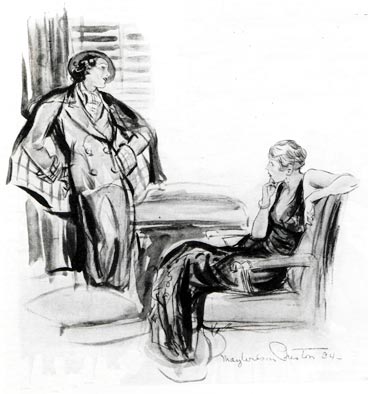Alice Duer Miller (July 28, 1874 – August 22, 1942) was an author, poet, and screenwriter. She is notable for, among other things, having published a collection of satirical poems, Are Women People? The title became a catchphrase for the women’s suffrage movement (she subsequently published a collection called Women are People!). This short story immerses the reader into the romantic escapades of Clarita’s parents. Or does it?
Read “A Friend of Her Parents” by Alice Duer Miller [PDF].
Become a Saturday Evening Post member and enjoy unlimited access. Subscribe now




Comments
Good ideas, Thomas, but doubtful if they’ll fall on listening ears. I think Saturday Evening Post is a mashup of 90s-style wellness articles and reprints from the 1940’s. No new fiction here.
Thank you, Mr. Waltz, for your reply. I could list these authors — there are some, not many, but a definite group underrepresented and at times even outcast from the current literary “establishment,” writers whose style and feel is closer to these antique reprints you have here in the Post than the silliness, crudity and often dumbed-down awfulness that is reigning unchallenged in the literary journals and magazines of the university elite.
But would it be even worth our time to discuss such a list here? Would these authors be welcome on your pages? What about the Saturday Evening Post magazine itself — where are those editors? Are they not on these comment boards, reading and engaging with readers? Do they have any interest in soliciting new talent? By the submission guidelines published by the Post, I think not: they state clearly that the Post “rarely” buys new fiction — and when it does, it cannot exceed “flash” length (1000-2000 words).
There had been talk some time back that the Post was going to reinvent itself again. I among others had hoped that it would become something like it used to be, in its heyday — with good relevant fiction and poetry and articles that spoke to everyday Americans. And now in the 21st century it could reinvent itself by launching as a web site, since even in doctor’s offices everybody has an iPad or a phone or Kindle or portable reader or internet device now. I would love to read a magazine that had the class and values of the classic Saturday Evening Post but that encouraged current writers who shared those ideals in order to guide the culture. Are the editors reading the slush and looking for new work that fits this mold? Are they really out there trying to do something big? It appears that the Post does not want to encourage, spotlight or celebrate new writers, and that’s a shame.
To clarify, I decide what short stories are republished on the website.
Mr. Cantwell, I whole-heartedly agree. I want to celebrate the modern authors who emulate the style of, for example, Alice Duer Miller. Which modern authors would you recommend be featured in the Post?
I love these old stories. Many are classics. Some are not, but they are exactly the kind of style you don’t see in any other magazine today. Everyone is talking about the ‘death of fiction’ and I believe the main reason is that today’s magazine editors don’t encourage good writing and excellent stories. Even the ‘tiny’ journals have this problem–none are popular because none have anything worth reading.
But I also have a problem with the Post. It’s nice you keep us nostalgic with Norman Rockwell covers and Booth Tarkington reprints, but if you want to be relevant, and popular, and part of the culture (and actually GUIDING that culture instead of following it), shouldn’t you be soliciting new work? Not all artists and writers are working in the current decadent mold. There are writers out there who are crafting the same quality stories as once popular two or three generations back. There are fine artists. All are a hidden minority, yes, but shouldn’t it be the job of the Post to encourage, spotlight, and CELEBRATE that minority? Then you would be relevant.
Enjoyed the charming, “old fashioned” manner in which the story unfolded. Though Alice Duer Miller’s plot was hardly intricate, the character analysis was rewarding This author fulfills the writer’s prime directive. She tells a good tale.
My poetry teacher recently shared with us some excerpts from “The White Cliffs,” a book by Alice Miller published in 1941. I thought Miller was commenting on
social dfferences between Americans and Britains from the standpoint of a British citizen. Then I researched the author to find that I was wrong. This wonderful poet and novelist had lived in England prior to my arrival there in 1950 as the wife of an Air Force officer who had served in WWII and been recalled during the Korean conflict. Alice Miller was simply demonstrating her expertise in communicating someone else’s opinions and social mores.